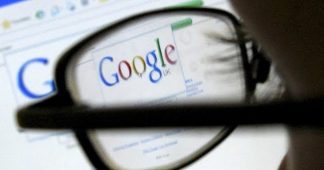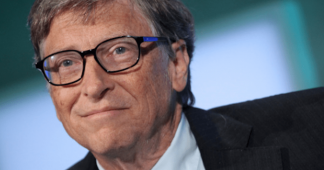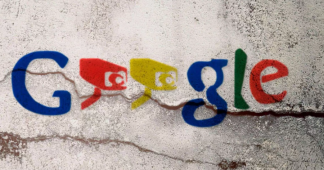Under Cover of Mass Death, Andrew Cuomo Calls in the Billionaires to Build a High-Tech Dystopia
By Naomi Klein
For a few fleeting moments during New York Gov. Andrew Cuomo’s daily coronavirus briefing on Wednesday, the somber grimace that has filled our screens for weeks was briefly replaced by something resembling a smile.
“We are ready, we’re all-in,” the governor gushed. “We are New Yorkers, so we’re aggressive about it, we’re ambitious about it. … We realize that change is not only imminent, but it can actually be a friend if done the right way.”
The inspiration for these uncharacteristically good vibes was a video visit from former Google CEO Eric Schmidt, who joined the governor’s briefing to announce that he will be heading up a blue-ribbon commission to reimagine New York state’s post-Covid reality, with an emphasis on permanently integrating technology into every aspect of civic life.
“The first priorities of what we’re trying to do,” Schmidt said, “are focused on telehealth, remote learning, and broadband. … We need to look for solutions that can be presented now, and accelerated, and use technology to make things better.” Lest there be any doubt that the former Google chair’s goals were purely benevolent, his video background featured a framed pair of golden angel wings.
Just one day earlier, Cuomo had announced a similar partnership with the Bill and Melinda Gates Foundation to develop “a smarter education system.” Calling Gates a “visionary,” Cuomo said the pandemic has created “a moment in history when we can actually incorporate and advance [Gates’s] ideas … all these buildings, all these physical classrooms — why with all the technology you have?” he asked, apparently rhetorically.
It has taken some time to gel, but something resembling a coherent Pandemic Shock Doctrine is beginning to emerge. Call it the “Screen New Deal.” Far more high-tech than anything we have seen during previous disasters, the future that is being rushed into being as the bodies still pile up treats our past weeks of physical isolation not as a painful necessity to save lives, but as a living laboratory for a permanent — and highly profitable — no-touch future.
Anuja Sonalker, CEO of Steer Tech, a Maryland-based company selling self-parking technology, recently summed up the new virus-personalized pitch. “There has been a distinct warming up to human-less, contactless technology,” she said. “Humans are biohazards, machines are not.”
It’s a future in which our homes are never again exclusively personal spaces but are also, via high-speed digital connectivity, our schools, our doctor’s offices, our gyms, and, if determined by the state, our jails. Of course, for many of us, those same homes were already turning into our never-off workplaces and our primary entertainment venues before the pandemic, and surveillance incarceration “in the community” was already booming. But in the future under hasty construction, all of these trends are poised for a warp-speed acceleration.
This is a future in which, for the privileged, almost everything is home delivered, either virtually via streaming and cloud technology, or physically via driverless vehicle or drone, then screen “shared” on a mediated platform. It’s a future that employs far fewer teachers, doctors, and drivers. It accepts no cash or credit cards (under guise of virus control) and has skeletal mass transit and far less live art. It’s a future that claims to be run on “artificial intelligence” but is actually held together by tens of millions of anonymous workers tucked away in warehouses, data centers, content moderation mills, electronic sweatshops, lithium mines, industrial farms, meat-processing plants, and prisons, where they are left unprotected from disease and hyperexploitation. It’s a future in which our every move, our every word, our every relationship is trackable, traceable, and data-mineable by unprecedented collaborations between government and tech giants.
If all of this sounds familiar it’s because, pre-Covid, this precise app-driven, gig-fueled future was being sold to us in the name of convenience, frictionlessness, and personalization. But many of us had concerns. About the security, quality, and inequity of telehealth and online classrooms. About driverless cars mowing down pedestrians and drones smashing packages (and people). About location tracking and cash-free commerce obliterating our privacy and entrenching racial and gender discrimination. About unscrupulous social media platforms poisoning our information ecology and our kids’ mental health. About “smart cities” filled with sensors supplanting local government. About the good jobs these technologies wiped out. About the bad jobs they mass produced.
And most of all, we had concerns about the democracy-threatening wealth and power accumulated by a handful of tech companies that are masters of abdication — eschewing all responsibility for the wreckage left behind in the fields they now dominate, whether media, retail, or transportation.
That was the ancient past known as February. Today, a great many of those well-founded concerns are being swept away by a tidal wave of panic, and this warmed-over dystopia is going through a rush-job rebranding. Now, against a harrowing backdrop of mass death, it is being sold to us on the dubious promise that these technologies are the only possible way to pandemic-proof our lives, the indispensable keys to keeping ourselves and our loved ones safe.
Thanks to Cuomo and his various billionaire partnerships (including one with Michael Bloomberg for testing and tracing), New York state is being positioned as the gleaming showroom for this grim future — but the ambitions reach far beyond the borders of any one state or country.
And at the dead center of it all is Eric Schmidt. Well before Americans understood the threat of Covid-19, Schmidt had been on an aggressive lobbying and public relations campaign pushing precisely the “Black Mirror” vision of society that Cuomo has just empowered him to build. At the heart of this vision is seamless integration of government with a handful of Silicon Valley giants — with public schools, hospitals, doctor’s offices, police, and military all outsourcing (at a high cost) many of their core functions to private tech companies.
It’s a vision Schmidt has been advancing in his roles as chair of the Defense Innovation Board, which advises the Department of Defense on increased use of artificial intelligence in the military, and as chair of the powerful National Security Commission on Artificial Intelligence, or NSCAI, which advises Congress on “advances in artificial intelligence, related machine learning developments, and associated technologies,” with the goal of addressing “the national and economic security needs of the United States, including economic risk.” Both boards are crowded with powerful Silicon Valley CEOS and top executives from companies including Oracle, Amazon, Microsoft, Facebook, and of course, Schmidt’s colleagues at Google.
As chair, Schmidt, who still holds more than $5.3 billion in shares of Alphabet (Google’s parent company), as well as large investments in other tech firms, has essentially been running a Washington-based shakedown on behalf of Silicon Valley. The main purpose of the two boards is to call for exponential increases in government spending on research into artificial intelligence and on tech-enabling infrastructure like 5G — investments that would directly benefit the companies in which Schmidt and other members of these boards have extensive holdings.
First in closed-door presentations to lawmakers and later in public-facing op-eds and interviews, the thrust of Schmidt’s argument has been that since the Chinese government is willing to spend limitless public money building the infrastructure of high-tech surveillance, while allowing Chinese tech companies like Alibaba, Baidu, and Huawei to pocket the profits from commercial applications, the U.S.’s dominant position in the global economy is on the precipice of collapsing.
The Electronic Privacy Information Center recently got access through a Freedom of Information Act request to a presentation made by Schmidt’s NSCAI one year ago, in May 2019. Its slides make a series of alarmist claims about how China’s relatively lax regulatory infrastructure and its bottomless appetite for surveillance are causing it to pull ahead of the U.S. in a number of fields, including “AI for medical diagnosis,” autonomous vehicles, digital infrastructure, “smart cities,” ride-sharing, and cashless commerce.
The reasons given for China’s competitive edge are myriad, ranging from the sheer volume of consumers who shop online; “the lack of legacy banking systems in China,” which has allowed it to leapfrog over cash and credit cards and unleash “a huge e-commerce and digital services market” using “digital payments”; and a severe doctor shortage, which has led the government to work closely with tech companies like Tencent to use AI for “predictive” medicine. The slides note that in China, tech companies “have the authority to quickly clear regulatory barriers while American initiatives are mired in HIPPA compliance and FDA approval.”
Read more at https://theintercept.com/2020/05/08/andrew-cuomo-eric-schmidt-coronavirus-tech-shock-doctrine/











